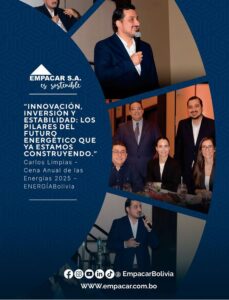“We don’t need more state institutions. We need better rules,” stated Carlos Limpias, General Manager of Empacar S.A., in a decisive tone during the 2025 Annual Energy Dinner (CAEE), held as every year in April.
ISSUE 142 | 2025
Abner Flores
In a context marked by economic, energy, and climate crises, the orange economy based on creativity, knowledge, and sustainability emerges as a solid alternative to energize Bolivia’s economy. However, the country’s institutional environment appears outdated in the face of the sector’s transformative potential.
During the CAEE 2025 dinner focused on energy institutionalism, Carlos Limpias, General Manager of Empacar S.A. a leading private sector company in Bolivia with nearly 50 years of experience in circular economy, recycling, and sustainability delivered a blunt critique of the current model: “We don’t need more state institutions. We need better rules.”
ORANGE ECONOMY AND SUSTAINABILITY: A VIABLE FORMULA
The orange economy encompasses everything from creative industries, software development, cultural production, and tourism to sustainable industrial activities such as recycling and waste valorization. Its value lies in transforming ideas and talent into high value-added goods and services.
According to data presented by Limpias, although the sector represents only 2% of Bolivia’s GDP, around 21% of the economically active population is involved in creative activities. This disparity indicates that with the right environment, its growth could be exponential.


DIAGNOSIS: AN OUTDATED INSTITUTIONAL FRAMEWORK
Limpias clearly outlined the main structural obstacles:
• Institutions designed for extractive sectors, incapable of adapting to circular or innovative dynamics.
• Lack of modern financial instruments, such as green bonds or impact investments.
• High legal uncertainty, with shifting regulations that undermine investor confidence.
• Excessive state intervention that stifles innovation and deters private capital.
As a concrete example, he mentioned the case of self-generation of electricity. He recalled how the government once encouraged companies to invest in private power generation due to its inability to meet demand, but later abruptly changed regulations, leading to discouragement, mistrust, and stalled projects involving multimillion-dollar investments.
“Today, producing energy in Bolivia is unfeasible because generators must buy spare parts in dollars but sell at a fixed rate in bolivianos. This creates an unsustainable imbalance,” he warned.
URGENT SOLUTIONS: LESS BUREAUCRACY, MORE MARKET
Within this framework, among the key proposals to reverse the situation, the executive suggested:
• Stable and clear rules as a minimum condition to attract investment.
• Access to international financing, especially through green or sustainable bonds.
• Facilitating functional public-private partnerships—though currently, none have truly been effective.
• Tax reforms to simplify procedures and reduce the fiscal burden on green industries.
He also emphasized that the State must allow the free issuance and purchase of sustainable bonds.

“There are hotels, universities, and companies seeking to attract those dollars that the country urgently needs, but the current regulations prevent it,” the speaker affirmed.

CIRCULAR ECONOMY AND CARBON CREDITS: A CONCRETE PATH
In the case of Empacar S.A., he noted that the company has already begun a process of measuring and offsetting its carbon footprint offsetting six times more than it emits and added that 60% of its logistics fleet is already electric.
However, he acknowledged that the road has not been easy: “We, being a large company with consultants and resources, struggle to access carbon credits. Imagine how difficult it is for a university, a hotel, or a small business.”
The speaker concluded his presentation with a powerful warning: Bolivia is not generating enough dollars to sustain its economy. Exports, remittances, and tourism are not enough. The orange economy could be one of the major solutions, but it needs the freedom to innovate and an environment that inspires trust.

“The problem is not a lack of creativity. The problem is a lack of clear rules. It’s time to change the conditions so that ideas can become dollars,” he concluded.

